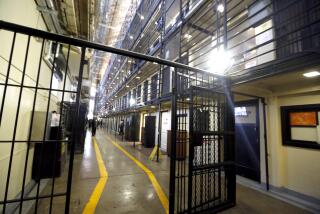Atty. Gen. Harris seeks to overturn ban on California executions
A federal judge’s “flawed” decision declaring California’s enforcement of the death penalty unconstitutional will be appealed, Atty. Gen. Kamala D. Harris announced Thursday.
Harris will ask the U.S. 9th Circuit Court of Appeals to overturn last month’s ruling by U.S. District Judge Cormac J. Carney, who said decades-long delays and uncertainty about whether inmates will be executed violated the Constitution’s 8th Amendment ban on cruel and unusual punishment.
“I am appealing the court’s decision because it is not supported by the law, and it undermines important protections that our courts provide to defendants,” Harris said.
Harris personally opposes the death penalty, but promised voters that she would enforce it. Legal analysts said the fate of Carney’s ruling will depend in part on which 9th Circuit judges are randomly selected to review it.
Carney’s ruling that California’s death penalty system was dysfunctional sparked national attention. The judge, who serves in Orange County and was appointed by former President George W. Bush, noted that more than 900 people have been sentenced to death in California since 1978, but only 13 have been executed.
“For the rest, the dysfunctional administration of California’s death penalty system has resulted, and will continue to result, in an inordinate and unpredictable period of delay preceding their actual execution,” Carney wrote. “As for the random few for whom execution does become a reality, they will have languished for so long on death row that their execution will serve no retributive or deterrent purpose and will be arbitrary.”
Opponents of the death penalty had urged Harris to let the ruling stand. Although the decision affected only the case before Carney, defense lawyers were gearing up to use the ruling’s rationale to fight death sentences in other cases. A ruling by the 9th Circuit would affect all of California and other Western states.
Supporters of the death penalty said the decision would never survive Supreme Court review. They noted that the delays Carney said doomed the system in fact stem from efforts to ensure that inmates receive competent lawyers and that their cases undergo thorough reviews. The delays have also been attributed to backlogs of appeals in overwhelmed courts and the state’s failure to propose a lethal injection method that would be practical and receive court approval.
Kent Scheidegger, a death penalty proponent and legal director of the Criminal Justice Legal Foundation, said appealing the ruling was the “correct decision.”
“So obviously one wonders what took [Harris] so long,” Scheidegger said, adding that “an executive officer’s constitutional duty is to see that the laws are faithfully executed, not just the laws he or she agrees with.”
Elisabeth Semel, a UC Berkeley law professor who directs the school’s Death Penalty Clinic, said it was impossible to predict what the 9th Circuit might do. She said the Supreme Court has not directly addressed the issues raised by Carney.
“The court has rejected delay as a viable 8th Amendment challenge in some cases, yes, but it hasn’t done so definitively,” Semel said. The high court has never ruled on a case in which the argument was that a state’s administration of the death penalty violated the Constitution, she said.
The ruling will be reviewed by a three-judge panel. That panel’s decision could be appealed to a larger group of 9th Circuit judges and then up to the Supreme Court.
If the 9th Circuit upheld Carney’s ruling and Harris decided not to appeal, it is unclear whether anyone else would have legal standing to do so.
No one in California has been executed since 2006, when a federal judge ruled that the state’s three-drug lethal injection procedure risked the possibility that inmates would suffer excruciating pain. The judge ordered the state to devise a new protocol.
The Brown administration has been working on a single-drug method of execution, but has yet to unveil it. Other states have had trouble getting supplies of lethal drugs because manufacturers don’t want their products used in executions.
Carney’s ruling overturned the death sentence of Ernest Dewayne Jones, a Los Angeles man who was sentenced to die for the 1992 rape and murder of Julia Miller, his girlfriend’s mother. The ruling relied on evidence gathered in several studies and reports.
For every inmate executed, seven on death row have died from natural causes, Carney wrote. To deplete death row, the state would have to execute more than one inmate a week for the next 14 years, he said.
“No rational person,” Carney said, “can question that the execution of an individual carries with it the solemn obligation of the government to ensure that the punishment is not arbitrarily imposed and that it furthers the interests of society.”
Twitter: @mauradolan
More to Read
Start your day right
Sign up for Essential California for news, features and recommendations from the L.A. Times and beyond in your inbox six days a week.
You may occasionally receive promotional content from the Los Angeles Times.







